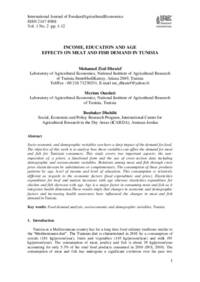Income, Education and Age effects on Meat and Fish Demand in Tunisia

Authors:
Socio-economic and demographic variables can have a deep impact of the demand for food. The objective of this work is to analyze how these variables can affect the demand for meat and fish for Tunisian consumers. This study covers two important aspects: the non-imposition of, a priori, a functional form and the use of cross-section data including demographic and socioeconomic variables. Relations among meat and fish through cross price elasticitiescan be substitutions or complementary. The consumption of these products patterns by age, level of income and level of education. This consumption is relatively different as regards to the economic factors (food expenditure and price). Elasticities expenditure for beef and mutton increases with age whereas elasticities expenditure for chicken and fish decrease with age. Age is a major factor in consuming meat and fish as it integrates health dimension.These results imply that changes in economic and demographic factors and increasing health awareness have influenced the changes in meat and fish demand in Tunisia.
